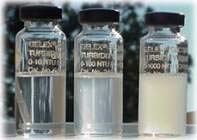Turbidity
(Redirected from Turbid)
Turbidity is a measure of how well light penetrates water. It is caused by particles (total suspended or dissolved solids) that are generally invisible to the naked eye. The measurement of turbidity is a key test of water quality.
Fluids can contain suspended particles of many different sizes. Some suspended material will be large enough and heavy enough to settle rapidly to the bottom if a liquid sample is left to stand. Very small particles settle very slowly or not at all if the sample is regularly agitated or the particles are colloidal. These small solid particles cause the liquid to appear turbid or murky.
Causes[edit | edit source]
Turbidity in open water may be caused by growth of phytoplankton.[1] Naturally occurring Algal blooms can cause turbidity. Human activities that disturb land can lead to high sediment levels entering water bodies during rain storms due runoff. These can include construction, mining and agriculture. pollution from paved surfaces such as roads, bridges and parking lots is another source.[2] Certain industries such as quarrying, mining and coal recovery can generate very high levels of turbidity from rock particles entering the water.
In drinking water, the higher the turbidity level, the higher the risk that people may develop diseases.[3] Contaminants like viruses or bacteria can become attached to the suspended solids. The suspended solids interfere with water disinfection with chlorine because the particles act as shields for the virus and bacteria. Similarly, suspended solids can protect bacteria from ultraviolet (UV) sterilization of water. (March 2011)
In water bodies such as lakes, rivers and reservoirs, high turbidity levels can reduce the amount of light reaching lower depths. This can limit growth of submerged aquatic plants. In turn this affects species which are dependent on them, such as fish and shellfish. High turbidity levels can also affect the ability of fish gills to absorb dissolved oxygen. This situation has been regularly observed throughout the Chesapeake Bay in the eastern United States.[4][5]
References[edit | edit source]
- ↑ Fundamentals of Aquacultural Engineering, ed. Thomas B. Lawson (Norwell, MA; The Netherlands: Kluwer Publishers, 2002), p. 19
- ↑ U.S. Environmental Protection Agency (EPA). Washington, D.C. "National Management Measures to Control Nonpoint Source Pollution from Urban Areas." Chapters 7 and 8. Document No. EPA 841-B-05-004. November 2005.
- ↑ A.G. Mann, C.C. Tam, C.D. Higgins, & L.C. Lodrigues. (2007). The association between drinking water turbidity and gastrointestinal illness: a systematic review. BMC Public Health. 7(256): 1 - 7
- ↑ U.S. Fish and Wildlife Service. Annapolis, MD. "Decline of Submerged Plants in Chesapeake Bay."
- ↑ EPA. Chesapeake Bay Program. Annapolis, MD. "Sediments."
Search WikiMD
Ad.Tired of being Overweight? Try W8MD's physician weight loss program.
Semaglutide (Ozempic / Wegovy and Tirzepatide (Mounjaro / Zepbound) available.
Advertise on WikiMD
|
WikiMD's Wellness Encyclopedia |
| Let Food Be Thy Medicine Medicine Thy Food - Hippocrates |
Translate this page: - East Asian
中文,
日本,
한국어,
South Asian
हिन्दी,
தமிழ்,
తెలుగు,
Urdu,
ಕನ್ನಡ,
Southeast Asian
Indonesian,
Vietnamese,
Thai,
မြန်မာဘာသာ,
বাংলা
European
español,
Deutsch,
français,
Greek,
português do Brasil,
polski,
română,
русский,
Nederlands,
norsk,
svenska,
suomi,
Italian
Middle Eastern & African
عربى,
Turkish,
Persian,
Hebrew,
Afrikaans,
isiZulu,
Kiswahili,
Other
Bulgarian,
Hungarian,
Czech,
Swedish,
മലയാളം,
मराठी,
ਪੰਜਾਬੀ,
ગુજરાતી,
Portuguese,
Ukrainian
Medical Disclaimer: WikiMD is not a substitute for professional medical advice. The information on WikiMD is provided as an information resource only, may be incorrect, outdated or misleading, and is not to be used or relied on for any diagnostic or treatment purposes. Please consult your health care provider before making any healthcare decisions or for guidance about a specific medical condition. WikiMD expressly disclaims responsibility, and shall have no liability, for any damages, loss, injury, or liability whatsoever suffered as a result of your reliance on the information contained in this site. By visiting this site you agree to the foregoing terms and conditions, which may from time to time be changed or supplemented by WikiMD. If you do not agree to the foregoing terms and conditions, you should not enter or use this site. See full disclaimer.
Credits:Most images are courtesy of Wikimedia commons, and templates, categories Wikipedia, licensed under CC BY SA or similar.
Contributors: Prab R. Tumpati, MD

